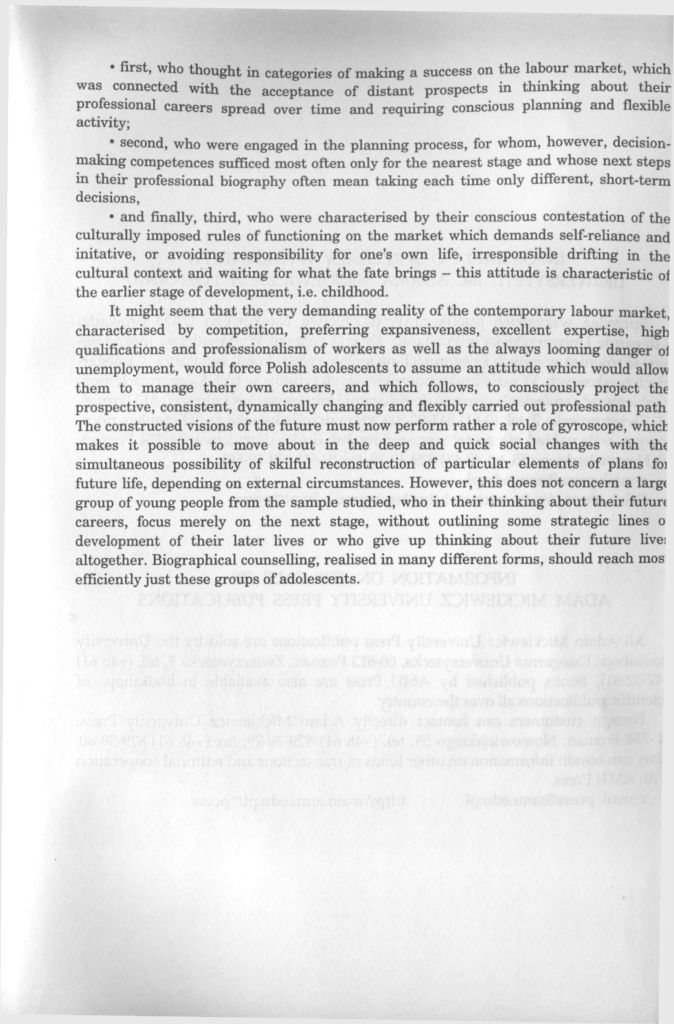267 (25)

• first, who thought in categories of raaking a success on the labour market, which was connected with the acceptance of distant prospects in thinking about their Professional careers spread over tirae and reąuiring conscious planning and flexible activity;
• second, who were engaged in the planning process, for whom, however, decision-making competences sufficed most oflen only for the nearest stage and whose next steps in their professional biography oflen mean taking each time only difTerent, short-term decisions,
• and finally, third, who were characterised by their conscious contestation of the culturally imposed rules of functioning on the market which demands self-reliance and initative, or avoiding responsibility for one’s own life, irresponsible drifling in the cultural context and waiting for what the fate brings - this attitude is characteristic of the earlier stage of development, i.e. childhood.
It might seem that the very demanding reality of the contemporary labour market, characterised by competition, preferring expansiveness, excellent expertise, high ąualifications and professionalism of workers as well as the always looming danger ol unemployment, would force Polish adolescents to assume an attitude which would allou them to manage their own careers, and which follows, to consciously project the prospective, consistent, dynamically changing and flexibly carried out professional path The constructed visions of the futurę must now perform rather a role of gyroscope, which makes it possible to move about in the deep and quick social changes with th< simultaneous possibility of skilful reconstruction of particular elements of plans foi futurę life, depending on extemal circumstances. However, this does not concem a large group of young people from the sample studied, who in their thinking about their futur* careers, focus merely on the next stage, without outlining some strategie lines o development of their later lives or who give up thinking about their futurę live: altogether. Biographical counselling, realised in many difTerent forms, should reach mos efTiciently just these groups of adolescents.
Wyszukiwarka
Podobne podstrony:
14 M. Piegza i in.INFLUENCE OF TR1CHODERMA STRAINS ON THE GROWTH OF PATHOGENIC MOULDS IN BIOTIC
Absolute chronology of the tumulus in Kolosy 157 reasons to ąuestion the radiocarbon dating, which w
sults of one’s work« on the competitive market (not taking into account the monopolistic positions o
55 3 EDGING Rnd 1: Ch 1, do not tum; sc in first corner; working in end of rows, work 130 sc cvenly
ńth Europę / Rafał Sadowski. Wspólwyd.: Partnership in times of crisis : challenges for the Eastern
SummariesElżbieta Babula Stochastic Modcling in Theory of Choicc undcr Risk The fact that neither un
m144 Practically every man in medieval Europc wore hose on the lower half of his body. They we
mbs 034 MY BRKATHI.YG SYSTEM other in a detinite space of time, and on the grcater or shorter durati
exe01 4 Correct the mistake in each of these sentences. Ignore the italłcs. u/as a) &nbs
trends in pharmacological treatment of schizophrenia presented on the XIV World Congress of Psychiat
134 where: pt is the area covered by vegetation in the s( class of anthropization. Depending on the
131 Hydrological conseąuences of human action.. on the lakes. In 1965 Piaseczno Lakę was provided wi
22 A. Łajczak the Lower Vistula, one of only eight on the main river, considerably reduces the suspe
więcej podobnych podstron